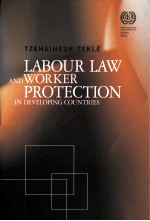

Labour law and worker protection in developing countriesPDF电子书下载
- 电子书积分:12 积分如何计算积分?
- 作 者:edited by Tzehainesh Teklè
- 出 版 社:Hart Publishing ; Geneva : ILO
- 出版年份:2010
- ISBN:9781841138879;1841138878
- 页数:301 页
Introduction 3
1. Labour law and worker protection in the South:An evolving tension between models and reality&Tzehainesh Tekle 3
1.1 Strengthening the presence of southern perspectives in the current debates on labour law 3
1.2 An analytical approach to studying the impact of labour law in the South 9
1.3 The structure of the book 11
1.4 The challenge of the mismatch between socio-legal categories and reality 12
1.4.1 The structural features of the world of work and labour law 12
1.4.2 A world of work in evolution 20
1.5 The problem of enforcement: Structural and new dimensions 32
1.6 Labour law and gender equality 36
1.6.1 The gendered construction of the law 36
1.6.2 Labour law and the promotion of gender equality at work 37
1.6.3 The interaction of labour law with otber brancbes of law and non-state sources of law 39
1.6.4 The impact of globalization 40
1.7 Conclusions 42
PART Ⅰ Worker access to labour law protection: Historical challenges and the impact of globalization 51
2. The effectiveness of labour law and decent work aspirations in the developing countries: A framework for analysis&Rachid Filali Meknassi 51
2.1 Introduction 51
2.2 The ineffectiveness of labour law as an expression of socio-legal pluralism 55
2.2.1 One labour law, many labour law systems 56
2.2.2 Inadequate integration into the dominant trade networks: The main source of legal ineffectiveness in the southern countries 63
2.3 The ineffectiveness of labour law: A symptom of the decent work deficit 69
2.3.1 The ineffectiveness of workers'rights and poor overall effectiveness of law 70
2.3.2 A fair globalization: A factor in promoting decent work and effective rights 84
3. Trade liberalization, labour law and development: A contextualization&Adelle Blackett 93
3.1 Introduction 93
3.2 The foundations of multilateral trade: Embedded liberalism and the convenience of colonialism 94
3.3 The inherent tension between trade liberalization, labour law and the role of the contemporary state in post-colonial developing economies 97
3.4 The terrain of labour law reform in developing countries 108
3.4.1 Mexico 108
3.4.2 The Caribbean Community (CARICOM) 112
3.4.3 Mauritius 117
3.4.4 Cambodia 120
3.4.5 The Republic of Korea 125
3.5 Towards global distributive justice 128
PART Ⅱ Labour law and worker protection in the South:Regional perspectives 135
4. Labour law in Latin America:The gap between norms and reality&Graciela Bensusan 135
4.1 Introduction 135
4.2 The evolution of labour law and the economic and political context 137
4.3 Worker protection under labour law: Old and new problems 142
4.3.1 The limited scope of labour law 142
4.3.2 Recent responses to changing forms of work 146
4.3.3 Problems relating to enforcement mechanisms 147
4.4 Gender equality: The case of Mexico 161
4.4.1 The legal framework and the situation of women workers in the labour market 162
4.4.2 The situation in the export-oriented maquila garment industry 166
4.5 Conclusions 170
5. Labour law: A southern African perspective&Colin Fenwick, Evance Kalula and Ingrid Landau 175
5.1 Introduction 175
5.2 The evolution of labour law in southern Africa 177
5.2.1 Colonization 177
5.2.2 Post-independence 178
5.2.3 Economic liberalization 180
5.2.4 Democratization 181
5.2.5 The role of the ILO 183
5.2.6 Regional integration 184
5.2.7 Concluding remarks 186
5.3 The challenges facing labour law in southern Africa 186
5.3.1 The socio-economic environment 186
5.3.2 The relationship of labour law to economic objectives 194
5.3.3 The scope of the employment relationship and changing patterns of work 198
5.3.4 The limited capacity of labour law institutions 208
5.4 Gender equality in Lesotho: A case study 212
5.4.1 The legal and policy framework 213
5.4.2 The role of labour law in reinforcing the existing gender inequalities 216
5.4.3 Proposed labour law amendments 217
5.4.4 The enforcement of labour laws 218
5.4.5 Complementarities between labour laws and other laws 220
5.4.6 Concluding remarks 222
5.5 Conclusions 222
6. Labour law in South Asia:The need for an inclusive approach&Kamala Sankaran 225
6.1 Introduction 225
6.2 Historical evolution 226
6.3 Labour law in South Asia: Features and proposals for reform 228
6.3.1 Features of labour law in the South Asia region 228
6.3.2 Current debates around labour law 241
6.4 Law and gender equality: The case of India 252
6.4.1 The gendered notion of"work" 252
6.4.2 The gendered notion of labour law 254
6.4.3 The gendered impact of "neutral" laws: Examples 255
6.4.4 The nature of labour law for women: Equality or protection? 257
6.4.5 Night work by women 258
6.5 Conclusions 259
Bibliography 261
Index 291
- 《Foundations of criminal law》[edited] by Leo Katz 1999
- 《R语言机器学习 原书第2版=MACHINE LEARNING USING R WITH TIME SERIES AND INDUSTRY-BASED USE CASES IN R》SECOND EDITION
- 《漫画半坡 英文版》Edited by Xian Banpo Museum 2015
- 《Variations I : extra materials》John Cage; C.F. Peters (Firm); Henmar Press (Firm); Edition Peters. 1960
- 《Law:its origin growth and function》by James Coolidge Carter 1907
- 《Cell death and diseases of the nervous system》edited by Vassilis E. Koliatsos,Rajiv R 1999
- 《Cell transplantation for neurological disorders》edited by Thomas B. Freeman,Hakan Widne 1999
- 《呼啸山庄》Notes by Angela Smith著 1990
- 《了不起的盖茨比》Notes by Tang Soo Ping 1990
- 《彝缅语研究》edited by the Editorial Committee of the International Yi-Burmese Conference 1992
- 《非线性量子力学》庞小峰编著 2009
- 《爱与意志》(美)罗洛·梅著;冯川译 1998
- 《牛虻》(英)艾·丽·伏尼契著;亚贤译 1995
- 《自杀风险管理手册》(加)库奇,(加)切希尔著 2011
- 《柴油发动机系统设计》(美)辛千凡著;(美)辛千凡译 2015
- 《WIESEL骨科手术技巧 足踝外科》(美)Sam W. Wiesel总主编;(美)Mark E. Easley主编;张长青总主译 2015
- 《永续生活 16个家的创想物语》(日)意迪著;林叶,袁璟译 2014
- 《创伤骨科》(美)威塞尔主编;张长青总主译 2015
- 《WIESEL骨科手术技巧 成人重建外科》(美)威塞尔(Sam W. Wiesel)总主编;(美)Javad Parvizi,Richard H. Rothman主编;张长青总主译 2015
- 《结直肠癌规范化诊疗 国际进展与中国实践荟萃》陈功,邱萌,张俊主编;袁瑛,黄鼎智副主编 2015
